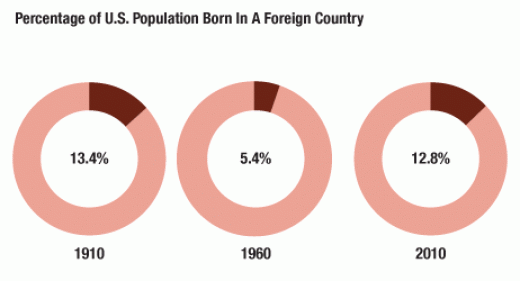By Megan Burks
Attitudes Toward Children of Undocumented Parents Easing
Multi-American reported this week more people support children of undocumented parents receiving social services than they did in 1995. But a majority is still opposed, saying the children should not receive free public education, school lunches and other benefits.
According to the study conducted by Gallup and Phi Delta Kappa International, a professional educators’ association, 41 percent of peopled polled said children who are in the United States legally but whose parents are not should receive public benefits. That’s up 28 percent since 1995.
A graphic by National Public Radio’s Lam Thuy Vo added an interesting lens to the discussion. It shows that despite shifting attitudes, the number of immigrants living in the U.S. hasn’t really changed in the past 100 years.
Source: Census Bureau
Credit: Lam Thuy Vo, NPR
What has changed is the countries from which they emigrated. See a visual explanation of the shift here.
Follow Multi-American @Multi_American.
Students of Color See Academic Gains Again This Year
Two reports out this week show students of color made academic gains again this year. According to the California Department of Education, about 92 percent of African-American students and 93 percent of Latino students passed the California High School Exit Exam last school year. Students of color in San Diego Unified made significant gains on the exit exam in 2011 also.
An analysis by the Pew Hispanic Center also found Latinos account for most of the growth in college enrollment nationwide. The number of Latinos entering college grew 15 percent in the past year, while white enrollment grew just 3 percent. Asian and African-American enrollment fell by 8 and 3 percent.
Follow the Pew Hispanic Center @PewHispanic.
Study: Payday Loans Used for Everyday Expenses
Another Pew study showed 69 percent of payday loans go toward bills and food instead of the one-time emergencies. KPBS asked San Diego State University professor Miro Copic to discuss what the findings mean for borrowers, most of whom make less than $25,000 a year. Watch Copic on KPBS Evening Edition below.
Follow KPBS Evening Edition @KPBSEvening.
More Things I Tweeted

